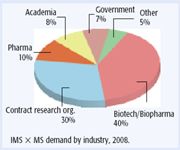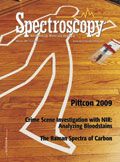Market Profile: IMS x MS
Mass spectrometry (MS) is a broadly used analytical technique that is often combined with some form of chromatography to provide a second dimension of separation. However, vendors recently have begun incorporating ion mobility separation (IMS) into high-end LC–MS instruments, thus providing an additional level of ion separation.
Mass spectrometry (MS) is a broadly used analytical technique that is often combined with some form of chromatography to provide a second dimension of separation. However, vendors recently have begun incorporating ion mobility separation (IMS) into high-end LC–MS instruments, thus providing an additional level of ion separation.

In mass spectrometry, analyte ions are separated based upon their mass-to-charge ratio. IMS, in contrast, separates ions based upon their effective size. While IMS is generally considered a poor-man's mass spectrometer, combining the two techniques into a single system provides complementary dimensions of separation, which is proving to be very useful for very dirty and complex samples. This has made IMS × MS very popular in biotechnology laboratories, as well as related CRO, academic, and government laboratories.
Ion mobility technology thus far has been incorporated as a filtering device on some Thermo Scientific triple quadrupole LC–MS systems, and as an actual separation device on Waters' high-end Q-TOF LC–MS systems. The technique is also being incorporated into some portable mass spectrometers for security applications. SDi estimates the combined market for the technique, which includes initial systems equipped with the technology, and aftermarket and service for system upgrades, to be around $40 million, and growing at a solid double-digit annual rate.
The foregoing data were based upon SDi's market analysis and perspectives report entitled Mass Spectrometry, February 2008. For more information, contact Stuart Press, Vice President – Strategic Analysis, Strategic Directions International, Inc., 6242 Westchester Parkway, Suite 100, Los Angeles, CA 90045, (310) 641-4982, fax: (310) 641-8851, www.strategic-directions.com.

High-Speed Laser MS for Precise, Prep-Free Environmental Particle Tracking
April 21st 2025Scientists at Oak Ridge National Laboratory have demonstrated that a fast, laser-based mass spectrometry method—LA-ICP-TOF-MS—can accurately detect and identify airborne environmental particles, including toxic metal particles like ruthenium, without the need for complex sample preparation. The work offers a breakthrough in rapid, high-resolution analysis of environmental pollutants.
The Fundamental Role of Advanced Hyphenated Techniques in Lithium-Ion Battery Research
December 4th 2024Spectroscopy spoke with Uwe Karst, a full professor at the University of Münster in the Institute of Inorganic and Analytical Chemistry, to discuss his research on hyphenated analytical techniques in battery research.
Mass Spectrometry for Forensic Analysis: An Interview with Glen Jackson
November 27th 2024As part of “The Future of Forensic Analysis” content series, Spectroscopy sat down with Glen P. Jackson of West Virginia University to talk about the historical development of mass spectrometry in forensic analysis.
Detecting Cancer Biomarkers in Canines: An Interview with Landulfo Silveira Jr.
November 5th 2024Spectroscopy sat down with Landulfo Silveira Jr. of Universidade Anhembi Morumbi-UAM and Center for Innovation, Technology and Education-CITÉ (São Paulo, Brazil) to talk about his team’s latest research using Raman spectroscopy to detect biomarkers of cancer in canine sera.